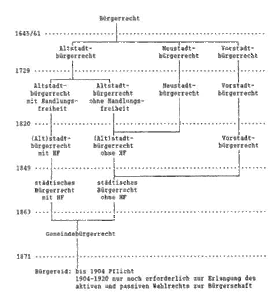The development of civil rights in Bremen from the 17th century until 1920. (Source: Karl Reineke. Das bremische Bürgerrecht, in Bremisches Jahrbuch 32, 1929, Seite 195-232)
Information about civil rights
People who lived in Bremen, or wanted to live in Bremen that didn’t have their citizenship yet, could receive it after handing in a request/application. You had to provide evidence that you fulfill the requirements to get your citizenship. Since the 17th century, the council of Bremen repeatedly changed the forms of civil rights.
It was the councilor’s duty to edit the requests. He could issue the citizenship, though he couldn’t issue it, if the apportionment dealt with the historic center’s civil rights combined with discretionary.
The fee could deviate depending on the form of the citizenship. The costs were paid in the councilor’s office. It also was the councilor’s task to manage an account book regarding earnings and outgoings. Circumstances for the deviation of civil rights and its change of dues (bill of charges) were each noted. The fees were defined collectively (different on occasion) with the exception of the historic center’s civil rights. Exceptions were individually determined by the council. Thus much is clear from the account books on new citizens, which is not visible in the citizen books, because the citizen books only record the required attainments of the citizen oath after obtaining citizenship.
Because of that, account books are good sources for genealogical research. In every volume there is an alphabetical index of proper names. There are indices that summarize account books into an entire alphabetical register.

